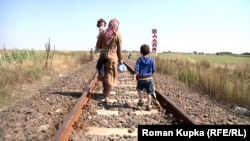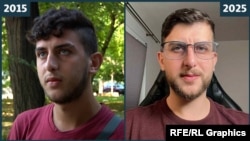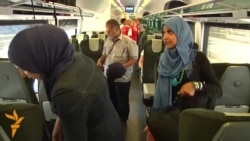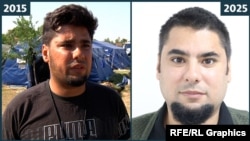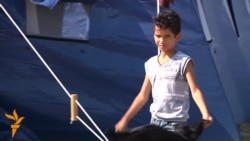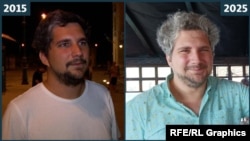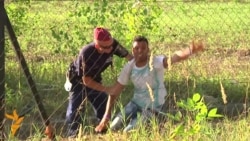Crouched on a curb in a parking lot, smoking furiously, Majedeldin Abdulhai was gathering strength for the next leg of a journey that had already almost killed him.
It was August 2015, and for weeks hundreds of thousands of people had been traveling from Turkey through the Balkans and on to seek asylum in Western Europe.
At the time, it was the biggest movement of people within Europe since World War II. For countries at all stages in the chain, the crisis caused major disruptions that continue to shape their politics and society today.
I took the same route for RFE/RL, telling the stories of those seeking safety and a new life, and of those helping them along the way. Ten years on, I've followed up to hear what happened next.
'I Had No Choice'
Abdulhai was an English literature student from Aleppo, Syria.
We met outside a cheap hotel in Belgrade accommodating refugees. Abdulhai recalled being plunged into the Aegean Sea after the rubber dingy he was traveling in was rammed by a military vessel.
"After two hours the Turkish Coast Guard came and took us," he said. "After that we went another way, to Marmaris in Turkey, and found a man who took us from Marmaris to Greece."
Abdulhai was now nervous about how he would make it through Hungary, which was building a fence to keep migrants out.
Now aged 30, he's living and working for a logistics company in Bad Kreuznach, Germany. No longer a smoker, he reflects on an unwanted "adventure" that began during a civil war fueled by foreign intervention.
"My studies were interrupted. I was unemployed for two years. The whole situation with rebels, ISIS, Al-Qaeda, Iranian militias…I had no choice [but to flee]," he says.
Abdulhai says another low point on the journey was when Serbian border guards tried to separate him from his group.
"The first time I felt like a person again was when I reached Germany," he says, adding he's "grateful" to the country despite the casual racism he says has grown since that time.
Germany took in around 1 million people, a political stress that was followed by the rise of the anti-migrant Alternative for Germany (AfD) party.
But Abdulhai regrets nothing and has applied for German citizenship. "A part of me is German," he says.
'Babies In Pizza Boxes'
Kemal El Shairy is Serbian.
Born in Libya to a Yugoslav mother and a Libyan father, in August 2015 he was a volunteer translator at the Kanjiza refugee camp in northern Serbia. He was horrified by the conditions there.
"People were (recently) sleeping on the streets. Babies were kept in pizza boxes. Doctors were coming only twice a week due to the lack of hygiene," he said.
A decade later, El Shairy says what struck him most was the sheer numbers.
"Since then, I worked in some places in eastern Africa, in Kuwait, and some other places. I've never seen such an influx," he says. "They were people who literally grabbed their bags and left, you know, for their lives."
The experience prompted El Shairy, then aged 28, to choose a career as an aid worker. "It really did change my life…. I became a humanitarian," he says.
Soon after the 2015 interview, Hungary and Croatia closed their borders, swelling the numbers of desperate people in Serbia.
A field report by the NGO that El Shairy worked for, the Balkan Migration Center (BCM), noted that "tensions within the centers are rising.... There is an increase in panic and hysteria attacks, fears, depressions, family violence, suicidal thoughts."
El Shairy believes the crisis, combined with economic pressures, had a strong impact on Serbia.
"It went to the right a lot," he says. "Whenever the situation gets tough economically, this nationalism and xenophobia rises, and I know people who look like me will be the first to be hit."
El Shairy is currently living in Benghazi, Libya.
From Academic To Electrician
From Kanjiza, people traffickers smuggled groups across the Hungarian border. In Szeged, 36-year-old Mark Kekesi was handing out free water and snacks at the railway station on a sticky August evening.
"Migrants keep coming continuously through the border, through the fence, which is now under construction. And it is a kind of shame for us that we are building fences between countries in 2015," he said.
Kekesi was an assistant sociology lecturer at Szeged University. Looking back, he remembers deciding to put his summer vacation to good use.
"This was, on the one hand, a humanitarian action. On the other hand, this was a message that not everybody is acting how the government wants us to," he says.
Hungarian Prime Minister Viktor Orban vowed to seal his nation's borders with razor wire, soldiers, and a high fence, saying refugees should not enter Europe. "We Hungarians are full of fear, people in Europe are full of fear," he said at the European Parliament on September 3, 2015.
Kekesi says Orban seized the crisis for political ends.
"Between those days and the outbreak of the coronavirus pandemic, our prime minister was notorious both internationally and domestically for basically speaking about nothing else but illegal immigration," he says.
Kekesi quit academia in 2016 "for personal reasons" to work as a freelance researcher, before a "midlife crisis" during the pandemic led him to become a self-employed electrician in Budapest.




